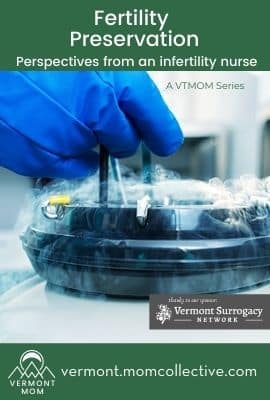Recommendations provided here are not intended to replace conversations with your own medical care provider.
Some people dream of having children but aren’t quite in the right place to do so. Work, health concerns, and lifestyle choices can all influence a person’s decision about when to have children. Luckily, advances in medical technology make it possible to essentially put a pause on an individual or couple’s fertility until circumstances change.
Fertility preservation is a blanket term that refers to the cryopreservation, the freezing and storing of either gametes (sperm, eggs) or embryos (fertilized eggs) for use at a later time. Using a technique called vitrification allows for eggs and embryos to be frozen in a way that can improve the chances of successful use in the future.
What kinds of situations would arise in which fertility preservation should be discussed and considered?
Fertility Preservation for Medical Reasons
People who have been diagnosed with cancer during their reproductive years should have a discussion with their oncologist about fertility preservation prior to starting treatment. Chemotherapy and radiation can cause irreparable damage to reproductive organs and cells, so it’s important to ask about options before the treatment begins in order to ensure that healthy cells are preserved. Many fertility centers will work closely with oncologists and with patients to get the fertility piece of the treatment done quickly.
Men and women who suffer from autoimmune disorders may require the use of medications that can also affect their fertility. It may be worth having a discussion with the treatment provider about potentially pausing or delaying the use of those medications in order to undergo the necessary processes for preserving eggs or sperm.
Some women have medical conditions, like endometriosis or ovarian cysts, in which the best treatment would involve the removal of one or both ovaries. For these women, undergoing IVF stimulation and egg retrieval can be considered in order to ensure that they can still have children using their own eggs in the future.
Fertility Preservation for Elective Reasons
In this day and age, women are choosing to delay starting a family more and more. Some women want to focus on building their careers. Others may not have found the right partner and don’t want to raise a child alone. Still others aren’t certain they even want to have children but don’t want to wait until it’s too late to decide. Egg preservation is a great option that can help ensure that when the time is right, it won’t be too late biologically. A woman’s fertility is finite, however, so having the discussion earlier in the reproductive years only maximizes future success, especially if family-building is postponed until after 40.
For individuals who identify as transgender, transitioning can sometimes mean making hard decisions about treatments that can make a huge impact on fertility and the ability to pass on genetic material. Sperm and egg freezing prior to starting the transition process should be discussed if the transitioning individual is interested in having biological children in the future. It can also be possible to pause hormonal treatments long enough to collect sperm or eggs, then resume the treatment after an adequate amount has been stored. There are multiple physical and emotional considerations that need to be addressed with this specific aspect of fertility preservation, so it’s essential that all members of the individual’s treatment team be available to offer support.
Eggs or Embryos?
Women who are in a straight relationship and are considering fertility preservation can decide to create embryos for use in the future. This can be a complicated decision to make and may not be right for all couples. If a relationship ends and embryos are in storage, a complicated legal battle to determine custody of those embryos can ensue. It’s important to have an open and frank conversation with all members of the team that includes both partners so that the best decision can be made.
Finding the right team and treatment plan is essential for any kind of fertility treatment, no matter when you are thinking about having children. Having the right resources and information will help you make decisions that will impact your life in the future when you are ready to start your family.
Vermont Mom would like to thank the Vermont Surrogacy Network for sponsoring this series.
Pin this post and be sure to follow Vermont Mom on Pinterest!














